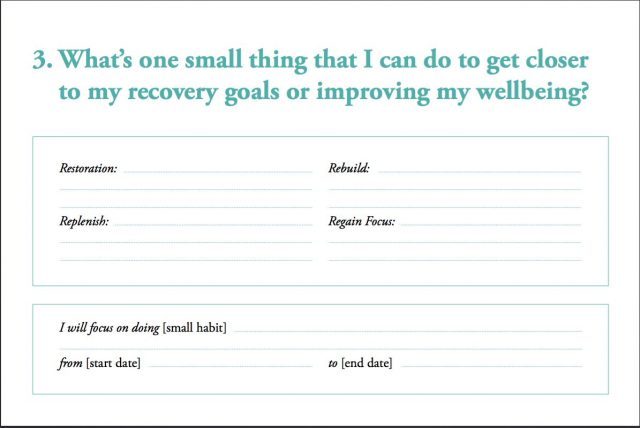Budgeting Tips for Managing Chronic Illness Expenses

This guest post is written by The Health Sessions reader Aniko Jori-Molnar, who shares her experiences with testing the strategies from ‘How to Create Your Own Action Plan for Recovery‘.
An important part of my identity is a fearless warrior that can handle (or can look like one who handles) everything in life. Good and bad. So I’m letting you in on a huge secret right now: I’ve been struggling with a chronic illness for nine years, and I’ve been struggling to accept this struggle.
I have EGPA (Churg-Strauss Syndrome), a rare auto-immune disease that attacks first and foremost the lungs, causing intense asthma symptoms, but then gradually causes all kinds of other problems in the body.
Of the many medication options, I’ve tried a few, and they’ve worked just fine, until now. With a recent heart involvement, the medical team decided to proceed to a chemo kind of drug for a more effective treatment. I feared the treatment as well as the signs of degrading health state I am in.
I could only think it is another milestone down the unlucky road. I was back to the old, pessimistic mental state. I was still not over the fact I’m sick forever. And I still wanted my old life back, and I would go as far as to throw a tantrum over it like a child.
I also knew this was not OK and I needed somebody (or something) to have my back when reality strikes. I needed to change the perspective.
It was the most important reason that made me want to read the book in the first place. Then I kept on reading for another reason.
It’s the voice, the allowing, soothing voice that made me feel accepted whatever my lifestyle choices. The balanced, up-to-date counseling that led me to seriously think about these optionss: recreation, eating habits, physical and mental fitness. All the while being honest with myself.
“I wish it were different, but some health problems cannot be fixed. […] But that doesn’t mean that making small lifestyle changes can’t help you feel a little healthier, happier and more energetic in the long run.”
In the middle of this ‘brainstorming session,’ there came the revelation that I had to recover from not the illness or the treatment but, before anything else, the chronic stress I’ve been enduring. Although I had considered myself lucky to work full time still, I also realized it’s time to work less if I wanted to start my recovery in the first place.
So I was reading the book, drafting these beautiful ideas in my mind about less stress, more awareness, and do everything right from now when I read:
“Often, once we’ve decided to start a new project, we want to go all-in. Green smoothies for breakfast? Check. Adding stretching, dry body brushing and mindfulness to our morning routine? Check. But trying to do everything at once is a recipe for disaster.
I’m guilty of wanting it all even when it comes to recovery. So the second step, of course, is not to be a maximalist. I need to aim lower: “focus on less to achieve more.” So here is the recovery plan:
I want to be fit enough to pursue my (sport) hobbies and spend a lot of time actively with my family.

1. Restoration/Sleep
Unfortunately, for the last couple of years, I developed all kinds of sleep problems, due to medications and their side effects. When you combine these with moving countries and the natural aging of the body no good comes out of it.
I can only nod at every single tip in the book regarding the prerequisites of a good sleep, but I also have to face it that this will be the hardest part for me to change. I’m covered on most levels, except for the comfy mattress, but I still to find out how to balance between activities that either give me pleasure or emotional stress, like watching some TV-series.
Note to self: guilty of late-night email-checking. Also, some improvement of bedtime rituals is necessary (Warm milk! Magnesium!), as well as the ‘worry sessions’ advised in the book. Oh and I could cite tons of other tips I still need to try!
2. Replenish/Eating Well
I think it’s the part that works the best for me when I’m not dead tired. I also agree with Jennifer on all the major guidelines about a healthy diet. My habits of healthy food choices have been evolving together with the growing up of my kids – now that they’re 11 and 6, there’s not much to regret about our daily food consumption. I found, though, that for us, meat is harder to let go than sugar, and with a consistently low level of iron in my body, I might never totally let it go as it’s easier to get it in with meat than with plants. So I loved the idea of a Meatless Monday, it seems so doable!
3. Rebuild/Fitness
As a person who has always been active and proud of it, every limitation is a source of so much frustration. I wonder if I’ll ever learn to align with the ups and downs of energy levels full-heartedly, but I have improved a lot and have learned to adjust my fitness goals accordingly, well, to some extent. A major challenge is to find the way to push me without exhausting myself.
About 5-6 years ago, I found yoga, and I consider it the best tool in a spoonie’s fitness toolbox. It is versatile enough to follow the roller coaster-type of illness manifestations: soothing if you feel down and challenging if you feel more than alright. So much that I have done some simple yoga stretches once in the hospital bed as well a day after I’d been admitted for acute breathing problems.
I try to keep it positive, but now with a failing heart, all becomes even more relative. That’s why the concept “functional fitness,” featured in this book, is so appropriate for me. And it was nice to see such a complete compilation of all the obstacles spoonies face when trying to exercise (my monster is number 3)!
4. Regaining Focus/Mental Issues
I would have also left this topic to be the last chapter because it is so hard for me. I hope more and more of you will hear about mental fog and fatigue way earlier on your spoony journey than I have. I thought I was underperforming when I couldn’t get my brain working at times! Only recently learned how some medications and the illness itself could turn you into a walking zombie.
Now that I understand that I’m not going crazy for real, I feel the strength to apply the tips to help my brain work better. Stopping to take some of my meds (following medical advice, of course) has already helped a lot. Still, I need to work on many more steps and acknowledge every little achievement.
Especially in organizing my surroundings, I want to have the energy to do a little every day because, unfortunately, our apartment reflects my inability to control a lot of things flowing in and our cleaning routines being in survival mode.
However, I’m thankful again for my kids to help me keep routines and my work makes my brain working hard every day. But I should really follow that advice about the need for daydreaming and schedule some “do-nothing” time!

To have the energy to work on my tailor-made recovery, I identified some small steps that would have the highest priority.
So, as you can see, my recovery journey is far from being over, and I’m sure this book will be my companion for a long time as well as the motto: “I’ve made from the bed to the couch, there’s no stopping me now!”
Thank you so much for sharing your experience Aniko!
Would you also like to start rebuilding your health today? Download your copy of ‘How to Create Your Own Action Plan for Recovery’ here.
 Aniko Jori-Molnar is a recovering maximalist and a fighter of a rare chronic illness, EGPA, for the last nine years. Writes marketing content for a living and, from time to time, blogs for passion. All this while raising two lovely creatures, an 11-year-old boy and a 6-year old girl, together with a matching hubby. Personal passions include reading (all the letters in sight), doing sports (yoga or rollerblading – health allowing), learning languages, and travelling by living (oh yeah, expat life rules).
Aniko Jori-Molnar is a recovering maximalist and a fighter of a rare chronic illness, EGPA, for the last nine years. Writes marketing content for a living and, from time to time, blogs for passion. All this while raising two lovely creatures, an 11-year-old boy and a 6-year old girl, together with a matching hubby. Personal passions include reading (all the letters in sight), doing sports (yoga or rollerblading – health allowing), learning languages, and travelling by living (oh yeah, expat life rules).
BewarenBewaren
BewarenBewaren
BewarenBewaren
BewarenBewaren
BewarenBewarenBewarenBewaren
BewarenBewaren
BewarenBewaren
BewarenBewaren